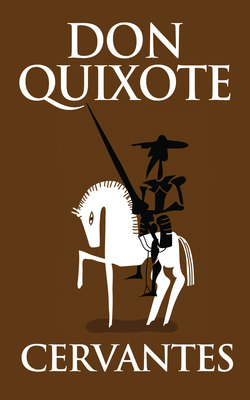Читать книгу Don Quixote - Cervantes - Страница 6
На сайте Литреса книга снята с продажи.
ОглавлениеSOME COMMENDATORY VERSES
URGANDA THE UNKNOWN
To the book of Don Quixote of la Mancha
If to be welcomed by the good,
O Book! thou make thy steady aim,
No empty chatterer will dare
To question or dispute thy claim.
But if perchance thou hast a mind
To win of idiots approbation,
Lost labour will be thy reward,
Though they'll pretend appreciation.
They say a goodly shade he finds
Who shelters 'neath a goodly tree;
And such a one thy kindly star
In Bejar bath provided thee:
A royal tree whose spreading boughs
A show of princely fruit display;
A tree that bears a noble Duke,
The Alexander of his day.
Of a Manchegan gentleman
Thy purpose is to tell the story,
Relating how he lost his wits
O'er idle tales of love and glory,
Of "ladies, arms, and cavaliers:"
A new Orlando Furioso-
Innamorato, rather—who
Won Dulcinea del Toboso.
Put no vain emblems on thy shield;
All figures—that is bragging play.
A modest dedication make,
And give no scoffer room to say,
"What! Alvaro de Luna here?
Or is it Hannibal again?
Or does King Francis at Madrid
Once more of destiny complain? "
Since Heaven it hath not pleased on thee
Deep erudition to bestow,
Or black Latino's gift of tongues,
No Latin let thy pages show.
Ape not philosophy or wit,
Lest one who cannot comprehend,
Make a wry face at thee and ask,
"Why offer flowers to me, my friend?"
Be not a meddler; no affair
Of thine the life thy neighbours lead:
Be prudent; oft the random jest
Recoils upon the jester's head.
Thy constant labour let it be
To earn thyself an honest name,
For fooleries preserved in print
Are perpetuity of shame.
A further counsel bear in mind:
If that thy roof be made of glass,
It shows small wit to pick up stones
To pelt the people as they pass.
Win the attention of the wise,
And give the thinker food for thought;
Whoso indites frivolities,
Will but by simpletons be sought.
AMADIS OF GAUL
To Don Quixote of la Mancha
SONNET
Thou that didst imitate that life of mine
When I in lonely sadness on the great
Rock Pena Pobre sat disconsolate,
In self-imposed penance there to pine;
Thou, whose sole beverage was the bitter brine
Of thine own tears, and who withouten plate
Of silver, copper, tin, in lowly state
Off the bare earth and on earth's fruits didst dine;
Live thou, of thine eternal glory sure.
So long as on the round of the fourth sphere
The bright Apollo shall his coursers steer,
In thy renown thou shalt remain secure,
Thy country's name in story shall endure,
And thy sage author stand without a peer.
DON BELIANIS OF GREECE
To Don Quixote of la Mancha
SONNET
In slashing, hewing, cleaving, word and deed,
I was the foremost knight of chivalry,
Stout, bold, expert, as e'er the world did see;
Thousands from the oppressor's wrong I freed;
Great were my feats, eternal fame their meed;
In love I proved my truth and loyalty;
The hugest giant was a dwarf for me;
Ever to knighthood's laws gave I good heed.
My mastery the Fickle Goddess owned,
And even Chance, submitting to control,
Grasped by the forelock, yielded to my will.
Yet—though above yon horned moon enthroned
My fortune seems to sit—great Quixote, still
Envy of thy achievements fills my soul.
THE LADY OF ORIANA
To Dulcinea del Toboso
SONNET
Oh, fairest Dulcinea, could it be!
It were a pleasant fancy to suppose so—
Could Miraflores change to El Toboso,
And London's town to that which shelters thee!
Oh, could mine but acquire that livery
Of countless charms thy mind and body show so!
Or him, now famous grown—thou mad'st him grow so—
Thy knight, in some dread combat could I see!
Oh, could I be released from Amadis
By exercise of such coy chastity
As led thee gentle Quixote to dismiss!
Then would my heavy sorrow turn to joy;
None would I envy, all would envy me,
And happiness be mine without alloy.
GANDALIN, SQUIRE OF AMADIS OF GAUL,
To Sancho Panza, squire of Don Quixote
SONNET
All hail, illustrious man! Fortune, when she
Bound thee apprentice to the esquire trade,
Her care and tenderness of thee displayed,
Shaping thy course from misadventure free.
No longer now doth proud knight-errantry
Regard with scorn the sickle and the spade;
Of towering arrogance less count is made
Than of plain esquire-like simplicity.
I envy thee thy Dapple, and thy name,
And those alforjas thou wast wont to stuff
With comforts that thy providence proclaim.
Excellent Sancho! hail to thee again!
To thee alone the Ovid of our Spain
Does homage with the rustic kiss and cuff.
